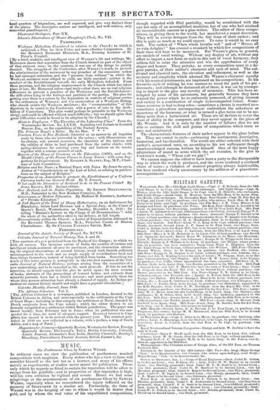M US IC.
Siz Posthumous Glees, by SAMUEL WEBBE.
IN ordinary cases we view the publication of posthumous musical compositions with suspicion. Every writer who has a view to fame will consider himself to the last but as a learner, and many of his efforts merely as experiments, or studies never meant for publication. Those only which he regards as fitted to sustain his reputation will he allow to escape from his portfolio ; and in proportion as that reputation is high, will his own criticism be vigilant and severe. Hence we had some misgivings at the announcement of six posthumous Glees by SAMUEL WEBBE, especially when we remembered the injury inflicted on the memory of SPOFFORTH by a similar act. Fortunately, the fame of WEBBE was in the keeping of one to whom it would be dearer than gold, and by whom the real value of his unpublished compositions, though regarded with filial partiality, would be scrutinized with the eye not only of an accomplished musician, but of one who had attained. no inconsiderable success as a glee-writer. The editor of these compo- sitions, in giving them to the world, has manifested a sound discretion. They will in nowise derogate from the fair fame of their author ; and this is quite as much as we could expect. To raise it would be no easy task. The author of "When winds breathe soft" and of " Hence, all ye vain delights!" has created a standard by which few compositions of their class will bear to be measured. But WEBBE'S glees, in general, are models of vocal writing. Without any display of art, without any effort to impart a new form or style to this sort of vocal harmony, they seldom fail to seize the attention and win the approbation of every singer and hearer. They partake, as every composition must in a de- gree partake, of their author's character and tarn of mind. The cul- tivated and classical taste, the elevation and refinement, as well as the modesty and simplicity which adorned Mr. WEBBE'S character equally with his musical attainments, are impressed on his compositions. In his favourite style of writing he was content to tread the path of his pre - decessors ; and although he distanced all of them, it was not by attempt- ing to impart to the glee any novelty of structure. This has been at- tempted by some of his successors, but generally because they have wanted the power which he so eminently possessed, of giving interest and variety to a combination of single unaccompanied voices. Some- times recourse is had to long solos—sometimes a chorus is resorted to— sometimes a pianoforte accompaniment embroiders the nakedness or monotony of the harmony, or what is termed a glee turns out to be no- thing more than a harmonized air. These are all devices to cover the want of ability in the composer, and they never appear in the glees of Mr. WEBBE. And it is only by the number of failures that we are able to estimate the skill and genius of compositions which seem so easy and unlaboured.
The characteristic features of their author appear in the glees before us. They are varied in style—embracing the sentimental, descriptive, humorous, and bacchanalian. The words are either selected with their author's accustomed taste, or, according to his not unfrequent though unacknowledged custom, written by himself. One of the most happy adaptations of sound to sense which the set contains, is the glee to COWPER'S words, "Whom call we gay ?" We cannot suppose the editor to have been a party to the disreputable way in which the work is produced, and the score rendered a confused chaos of notes ; a violation of musical propriety always indefensible, but here rendered wholly unnecessary by the addition of a pianoforte- accompaniment.






























































 Previous page
Previous page